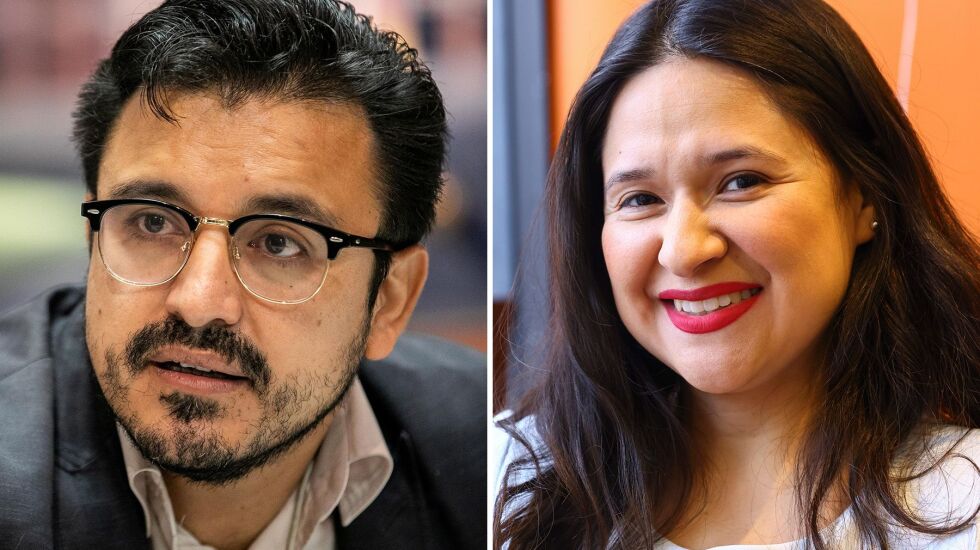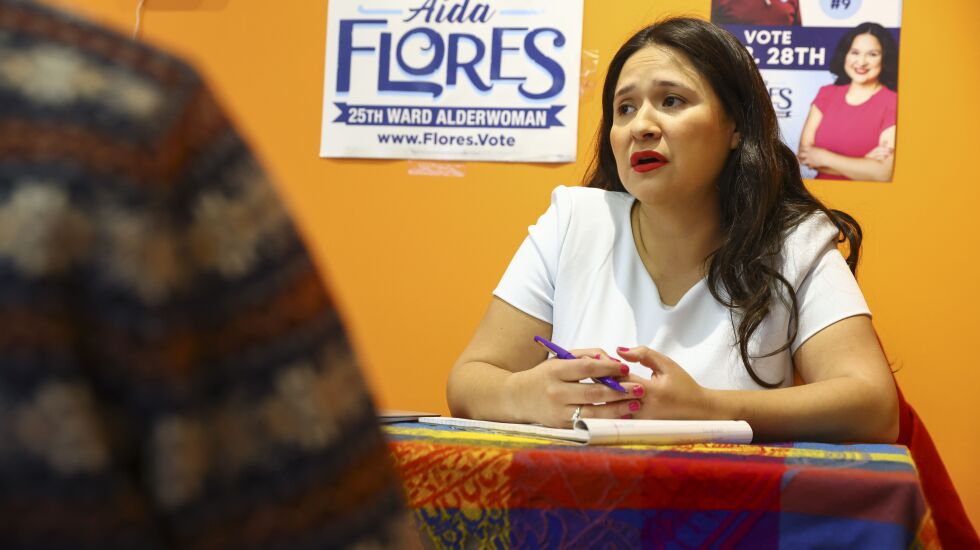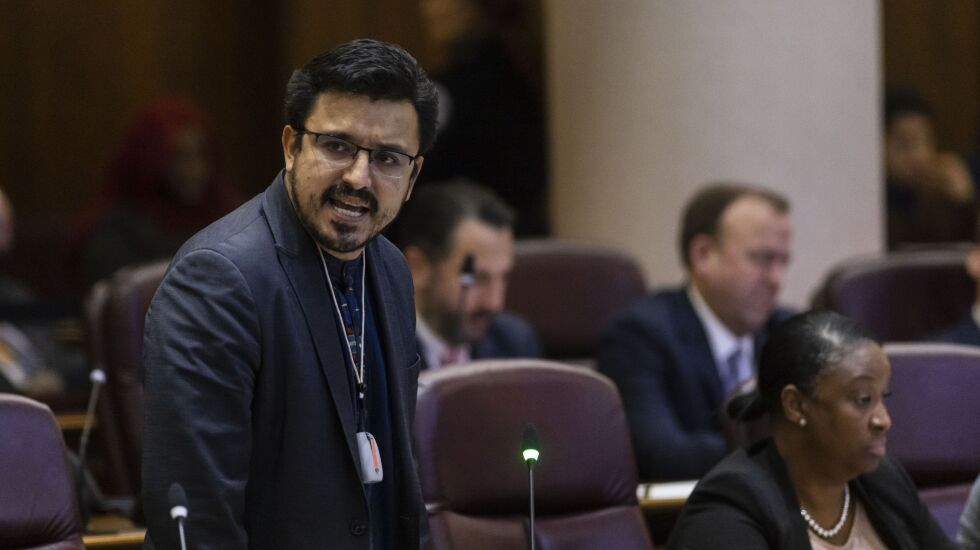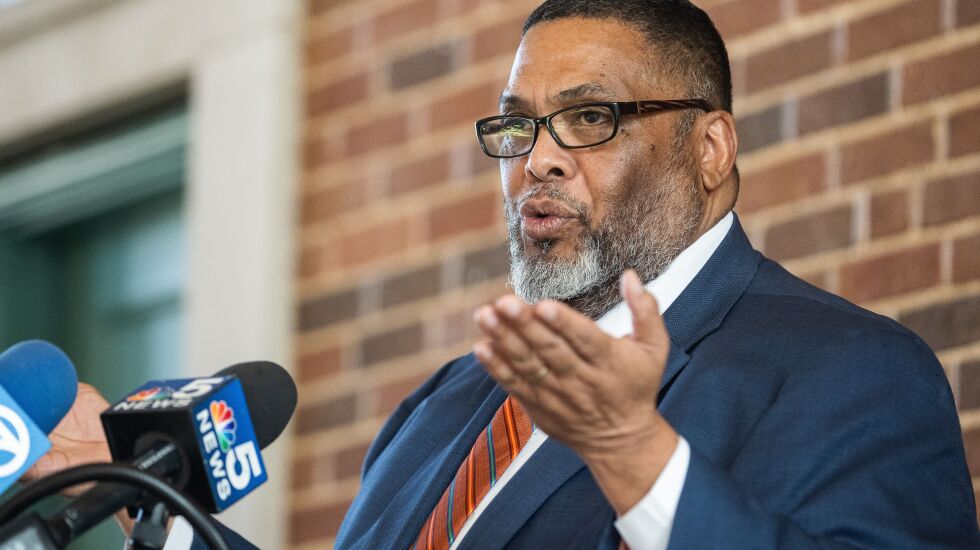
Many people were quick to act on that day in mid-December when a mass shooting outside outside Benito Juarez Community Academy killed two teens and wounded two others.
First responders taped off the area.
Parents rushed to find their children.
And the local City Council member, as well as the woman who wants his job, showed up to check on neighbors and wonder how it happened.
Classes were ending at the school in Pilsen when the shots rang out the afternoon of Dec. 16. The incident highlighted what already was among the biggest concerns for Chicago voters, including in contested Council races in the 25th and 29th wards.
Ald. Byron Sigcho-Lopez (25th) had held a news conference only hours before about rising crime. Aida Flores, 37, his opponent in the Feb. 28 election and a Juarez graduate, left work to go check on colleagues at the school, where she once worked.
This year’s race in the Near Southwest Side ward is a rematch. Sigcho-Lopez, 39, is seeking his second term after defeating Flores in 2019.

Florez, like many Council candidates, is focused on crime, the top issue for many Chicagoans, according to a new Sun-Times/WBEZ/Telemundo Chicago/NBC5 Poll.
Another major concern is affordability. Area residents were among the hardest hit by property tax increases.
The 25th Ward includes parts of Pilsen, Chinatown, Little Italy and University Village. It’s a longstanding haven for immigrants, many from Latin America, including Sigcho-Lopez, who is from Ecuador. Flores is the first of her family born outside Mexico. The ward is 70% Latino, according to a WBEZ analysis of census data.
Close in age, from immigrant households and well-educated — Sigcho-Lopez has a master’s in economics, Flores a master’s in education — the candidates appear similar, but draw on different supporters.
Sigcho-Lopez, a member of the Council’s Democratic Socialist Caucus, has been endorsed by the Chicago Teachers Union, as well as by mayoral candidate Brandon Johnson.
Flores is endorsed by another mayoral candidate, U.S. Rep. Jesus “Chuy” Garcia, and has received financial backing from neighborhood businesses including the Discount Mall, according to campaign disclosure statements.
Flores has spent most of her career at Chicago Public Schools, and is now assistant principal at Darwin Elementary in Logan Square.
“Our alderman has a pattern where he delays working on something until it’s a boiling point and then shows up and is argumentative about it,” she said. “It’s important to have collaborative leadership.”

Sigcho-Lopez wasn’t surprised by the criticism.
“I know some people don’t like what I say but that’s exactly why I was elected to be alderman,” said Sigcho-Lopez, who got into politics after successfully fighting the closure of local public schools.
The ward saw a 31% increase in all crimes in 2022 compared to 2021 — though that’s slightly below the citywide increase of 40%.
Sigcho-Lopez believes crime will fall as economic pressures ease.
He also touted an affordable housing development going on a long-vacant lot at 18th and Peoria streets.
Flores said fostering the neighborhood block initiatives she remembered from growing up in the neighborhood would help. “Despite the obstacles that we faced, we had community,” she said.
Three-way race in 29th Ward
In the 29th Ward on the West Side, a majority of residents are Black. The ward includes Austin, Galewood and Montclare and is represented by Ald. Chris Taliaferro, the city’s chairman of the public safety committee.
Taliaferro faces two challengers — CB Johnson and newcomer Corey Dooley.

Johnson, 62, is from the West Side and has led nonprofit Campaign for a Drug-free West Side since 1999. Dooley, 25, moved from Texas to Illinois to attend Concordia University on a football scholarship and has lived in Austin for the past year and a half.
He has volunteered for the Chicago Police Department as part of CPD’s youth advisory council and recently worked for the Austin African American Business Networking Association.
Both challengers want to make the ward safer. “My family has been here since November 1971,” Johnson said. “This was a very beautiful, safe place to live back in that time. And it’s still beautiful, and it can be safe once again.”
The ward’s 7.5% increase in crime over the past year was, however, much less than Chicago overall, according to city data.

Dooley, a survivor of gun violence, championed the potential of the “Soul City Corridor,” which he worked on with networking association. “We need to make sure we’re investing in the hyperlocal economy and cultural economy,” he said.
Taliaferro, 57, was also excited about the corridor.
“We haven’t seen this type of growth in decades. We’re seeing it blossom as if it were a new flower,” he said.
He recently lost a bid for Cook County judge, but dismissed criticism he wasn’t interested in a third Council term.
“There’s nothing wrong with trying something different,” he said. “That doesn’t mean you lost your love and compassion for the people you serve.”

Michael Loria is a staff reporter at the Chicago Sun-Times via Report for America, a not-for-profit journalism program that aims to bolster the paper’s coverage of communities on the South Side and West Side.







